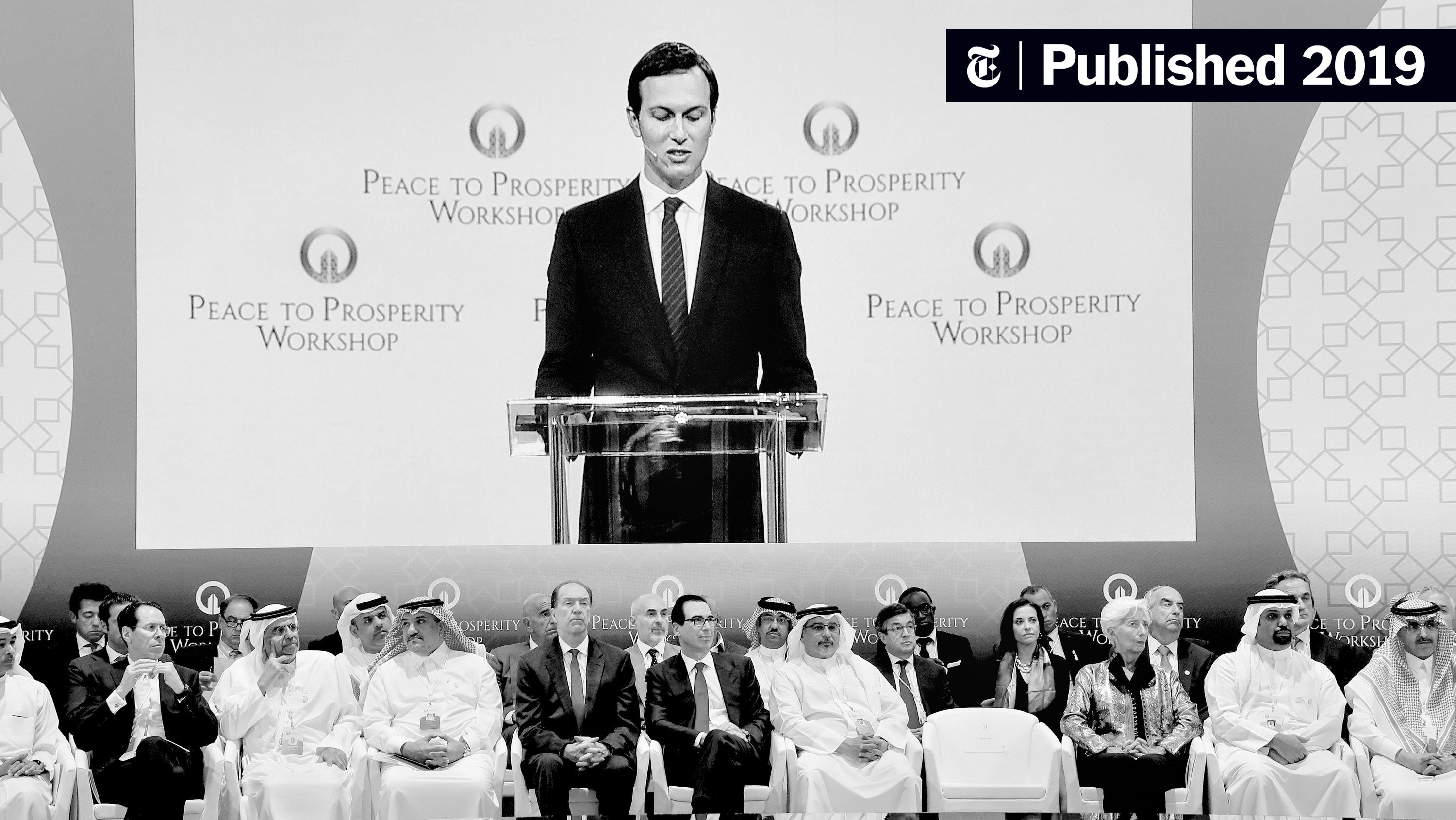Jared Kushner's Influence On Trump's Middle East Policy

Table of Contents
Donald Trump's Middle East policy, broadly speaking, aimed to achieve peace between Israel and the Palestinians while also countering Iranian influence and strengthening alliances with key regional partners. However, the approach and specific strategies employed were significantly shaped by Kushner’s involvement, leading to both successes and considerable controversy.
Kushner's Role and Responsibilities
Jared Kushner's official title was Senior Advisor to the President, but his unofficial role regarding Middle East policy was far more expansive. Remarkably, he assumed this significant responsibility despite lacking any prior experience in foreign policy or diplomacy. His close relationship with President Trump, coupled with his direct access, allowed him to play a pivotal role in shaping and implementing key initiatives.
- Advisor to the President on Middle East policy: Kushner held significant sway in decision-making processes concerning the region.
- Direct involvement in negotiations and diplomatic initiatives: He engaged personally in high-stakes negotiations, often bypassing traditional diplomatic channels.
- Close relationship with key players in the region: Kushner cultivated relationships with leaders across the Middle East, facilitating communication and negotiation.
- Access to President Trump, allowing for significant influence: His proximity to the President gave his opinions and recommendations considerable weight.
This unusual trajectory – a relative newcomer to foreign affairs holding immense power – naturally attracted scrutiny and debate. His actions frequently challenged established diplomatic norms, adding to the complexity of analyzing his impact.
Key Policy Initiatives and Kushner's Involvement
Kushner's involvement is visible in several key policy initiatives, most notably the Abraham Accords and the "deal of the century" peace plan for Israel and Palestine.
The Abraham Accords
Kushner played a crucial, and often secretive, role in brokering the Abraham Accords, which normalized relations between Israel and several Arab nations, including the United Arab Emirates, Bahrain, Morocco, and Sudan.
- Negotiations and diplomacy with involved parties: Kushner engaged directly with leaders from both Israel and the Arab nations, employing discreet back-channel diplomacy.
- Secrecy surrounding the process and Kushner's direct engagement: Much of the negotiation process was shrouded in secrecy, adding to the intrigue and controversy surrounding his involvement.
- Long-term implications of the Accords and Kushner's contribution: The Abraham Accords represent a significant shift in regional dynamics, and Kushner’s role in achieving this landmark agreement is undeniable.
Other Policy Initiatives
Beyond the Abraham Accords, Kushner was deeply involved in developing a comprehensive peace plan for Israel and Palestine, often referred to as the "deal of the century." While ultimately unsuccessful in achieving a lasting peace agreement, this initiative highlights his ambition and influence within the Trump administration's Middle East policy.
- Specific proposals and their impact: The plan included proposals on borders, Jerusalem, and the status of Palestinian refugees, sparking intense debate and rejection by Palestinian leadership.
- Criticisms and controversies surrounding these initiatives: The plan was criticized for being heavily biased towards Israel, neglecting key Palestinian concerns.
- Kushner's defense of his approach and rationale: Kushner defended his approach, arguing it offered a realistic framework for a two-state solution, though this assertion remains highly contested.
Analysis of Kushner's Influence
Assessing Kushner’s influence requires examining specific instances where his involvement shaped decisions. His unique approach, often described as back-channel diplomacy, bypassed traditional bureaucratic processes, potentially accelerating some initiatives but also creating vulnerabilities and criticism.
- Examples of decisions directly influenced by Kushner: His involvement in shaping the approach to the Iran nuclear deal and the shifting dynamics with Saudi Arabia are prime examples.
- Analysis of his approach (e.g., back-channel diplomacy): While this approach sometimes proved effective, it also lacked the transparency and accountability of conventional diplomatic processes.
- Assessment of the success and failures of the policies he shaped: The Abraham Accords represent a success, while the failure to achieve a lasting Israeli-Palestinian peace underscores the complexities and limitations of his approach.
Criticism and Controversy
Kushner's involvement in Middle East policy was not without its share of criticism and controversy. His lack of experience, combined with accusations of potential conflicts of interest due to his family business dealings, fueled significant debate.
- Specific examples of criticism from experts and the media: Critics pointed to the lack of consultation with traditional diplomatic experts and the potential for bias due to his family’s business interests.
- Counterarguments and defenses of Kushner's actions: Supporters argued that his unconventional approach and direct engagement were necessary to break through diplomatic stalemates.
Long-Term Implications of Kushner's Influence
The long-term implications of Kushner's influence on US-Middle East relations remain to be fully seen. The Abraham Accords have reshaped regional alliances, but the Israeli-Palestinian conflict persists. His legacy is complex and multifaceted.
- Long-term effects of the Abraham Accords: These agreements could foster greater regional stability or lead to further complexities, depending on future developments.
- Impact on the Israeli-Palestinian conflict: The “deal of the century” ultimately failed to resolve the conflict, leaving the situation unresolved.
- Changes in US relationships with key regional players: Kushner's actions affected relationships with various countries in the region, some strengthened and others strained.
Conclusion: Assessing Jared Kushner's Legacy on Middle East Policy
Jared Kushner’s role in shaping the Trump administration's Middle East policy was undeniably significant. His involvement, marked by both successes like the Abraham Accords and failures like the stalled Israeli-Palestinian peace process, fundamentally reshaped the landscape of US foreign policy in the region. His unconventional approach, while effective in some instances, also generated significant criticism and controversy. The long-term consequences of his influence remain a subject of ongoing debate and require further careful analysis. To understand fully the nuances of Kushner's Middle East policies, further research into the specifics of his various initiatives and their consequences is encouraged. Examining criticisms and alternative perspectives on the Trump administration's approach is vital for a complete picture of Kushner’s influence on the Middle East.

Featured Posts
-
 Re Evaluating John Wick 4 A Deeper Look Beyond The Rotten Tomatoes Score
May 11, 2025
Re Evaluating John Wick 4 A Deeper Look Beyond The Rotten Tomatoes Score
May 11, 2025 -
 Find Local Obituaries Stoke On Trent And North Staffordshire
May 11, 2025
Find Local Obituaries Stoke On Trent And North Staffordshire
May 11, 2025 -
 Cooyahs Grand Slam Track Collection A New Line Of Jamaican Inspired Apparel
May 11, 2025
Cooyahs Grand Slam Track Collection A New Line Of Jamaican Inspired Apparel
May 11, 2025 -
 Action Thriller Armor Stream Sylvester Stallones Latest Free This Month
May 11, 2025
Action Thriller Armor Stream Sylvester Stallones Latest Free This Month
May 11, 2025 -
 Payton Pritchards Childhood Connection A Career Milestone Made More Meaningful
May 11, 2025
Payton Pritchards Childhood Connection A Career Milestone Made More Meaningful
May 11, 2025
